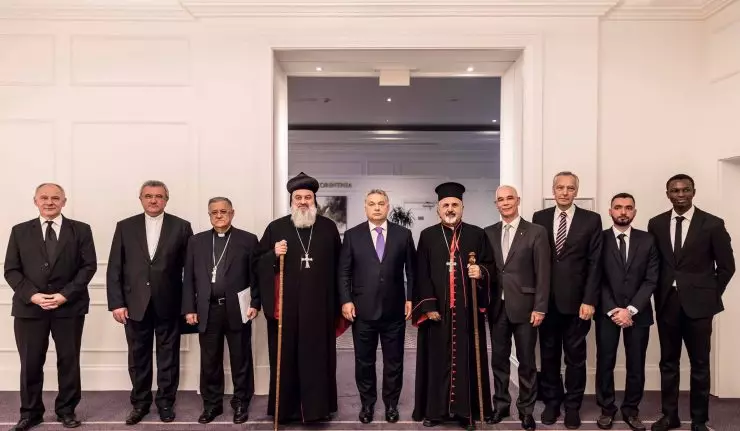Article originally published on ncregister.com. Written by Edward Pentin.
Hungary, Budapest – Prime Minister Viktor Orbán opens conference by calling on nations, particularly in Europe, to cast aside political correctness, stand up against Christian persecution, and defend the roots of Christian civilization.
It is time for Europe to free itself from the shackles of political correctness, speak the truth, and face the facts about the violent persecution of Christians, Hungary’s Prime Minister Viktor Orbán said on Thursday, October 12.
In a hard-hitting speech delivered at the opening of the first major conference ever held by a government in support of persecuted Christians, Orbán said that the “forced expulsion” of Christians from parts of the Middle East and Africa are “crimes” against the people and communities concerned that also “threaten our European values.”
“The world should understand that what is at stake today is nothing less than the future of the European way of life, and of our identity,” he told the delegates in Budapest.
Over 300 participants from 30 countries, including Christian leaders and representatives from think tanks and charities, gathered for the Oct. 11-13 international consultation on Christian persecution — “Finding the Appropriate Answers to a Long Neglected Crisis.”
The Hungarian leader, who has been an outspoken defender of Christian values in Europe — and has suffered a backlash from the European Union and others as a result — said it is time to “liberate” the issue from the “shackles of political correctness and human rights incantations which conflate everything with everything else.”
Rather, he said, we are “duty bound” to use facts and “straight-forward language” in describing these events and to “identify the dangers that threaten us.” Four out of five persecuted people are Christians, Orbán noted, and the religion is the most persecuted in the world today, yet the international media gives it “little coverage.”
Furthermore, he said the “greatest danger” is the “indifferent, apathetic silence of a Europe which denies its Christian roots.” The fate of what is happening in the Middle East should “bring home to Europe” what “may also happen to us” he said, at a time when European governments are pursuing an immigration policy that allows in “dangerous extremists” and will “utterly transform” its culture, ethnicity and Christian identity within a “few generations.”
After centuries of fighting to defend the “whole of Christian Europe,” and having lived under atheistic Communist dictatorships for much of the 20th century, Orbán said it is a “cruel, absurd joke of fate” to be again living as members of a community “under siege.”
But for all these reasons, he said Hungary wishes to be at the forefront of helping persecuted Christians, and referred to the watchman in the Book of Ezekiel to underline its responsibility: “If a watchman sees the enemy approaching and does not sound the alarm, the Lord will hold that watchman accountable for the deaths of those killed as a result of his inaction.”
“Europe is a Christian continent,” he said, “and this is how we want to keep it.”
Orbán highlighted the fact that Hungary, although only a “medium sized European state,” is a “stable country” and unlike many other countries, is therefore in a position to “speak up for persecuted Christians.” But he stressed it’s not just about talking but acting, and he drew attention to some of the initiatives it has taken, in particular being the only government to set up a ministry dedicated to helping persecuted Christians. (The Deputy State Secretariat for the Aid of Persecuted Christians began work last year.)
He gave an overview of its achievements so far, which include rebuilding Christian homes, funding scholarships, and resettling displaced Christians. He said he drew attention to these deeds not to “burnish our reputation” (he said the government avoids “doing good things out of calculation, as good deeds must come from the heart, and for the glory of God”) but rather to serve as an example to other countries in the hope they might do likewise.
“When we support the return of persecuted Christians to their homelands, the Hungarian people is fulfilling a mission,” Orbán said, noting that Hungary’s Constitution recognizes “the role of Christianity in preserving nationhood.”
“If we recognize this for ourselves, then we also recognize it for other nations,” he said. Hungarians, he added, want Christian communities returning to their homelands, becoming “forces for the preservation of their own countries, just as, for us, Hungarian Christianity is a force for preservation.”
He closed by urging Europe’s politicians “to cast aside politically correct modes of speech” and “human rights-induced caution” and instead “do everything within their power for persecuted Christians.”
Open Eyes of Europe
The two day conference featured a wide variety of speakers who underlined a number of common themes: that Christian communities in the Middle East are on the brink of extinction; that the West is showing a lamentable amount of attention and concern to their plight (but which they often give to other persecuted groups instead); and the need to give aid directly to those affected through the churches so Christians can remain, be resettled, and rebuild their homes and lives.
All the foreign speakers heaped praise on Hungary for stepping up to the plate and offering tangible help specifically for Christians.
The president of the Hungarian bishops’ conference, Bishop Andràs Veres of Györ, highlighted Hungary’s own history of suffering in defense of the faith which has given “compassion in our own hearts” and admiration for the “courage” of today’s persecuted Christians.
Zoltán Balog, minister for Human Capacities who runs the ministry for persecuted Christians, said loving others does not mean covering up the truth nor failing to express it. Drawing attention to the plight of Christians, and the work his ministry is doing, is vital to “open the eyes of people in Europe,” he said.
“We Hungarians were sentenced to death many times. Hungary was told it was going to disappear, but we learned to swim against the tide, and today we need to swim together” in order to “advance,” he said.
Chaldean Patriarch Louis Sako of Baghdad, in a message delivered by Archbishop Bashar Warda of Erbil, expressed “heartfelt thanks” to the Hungarian government for the help they have received in this “tragic situation.” (He noted, for example, its donation of $2.4 million to support 1,000 families to return to the predominantly Christian Iraqi city of Teleskof that was overrun by ISIS in 2014.)
He said there was a drastic decline of Iraqi Christians, from 1.5 million in 2003 to less than 500,000 today. He also warned that a Sept. 25 referendum in which 90 percent of Kurds in northern Iraq voted to secede from Iraq has “accelerated tensions” between Iraqis and Kurds, leading to “the drums of war.”
If it leads to a new military conflict, he said, “the consequences will be a disaster for all and minorities will pay the highest price.” He foresaw for certain “another exodus of Christians” if that happened, adding he could see “no guarantees” to stop the “vanishing of an innocent and peaceful people, violently forced from their homeland because of their faith.”
But Archbishop Warda was more optimistic, telling the Register later that he believed all these political disputes can be resolved, and it now could even be “the time to resolve them for good.”
“We are fed up with crisis after crisis,” he said, adding that he and other Church leaders have been imploring the politicians to dialogue. If these issues are indefinitely postponed, “it’s not healthy,” he said.
In his speech, Patriarch Sako called on the international community to help, especially the U.S. which has a particular “moral responsibility,” and highlighted the importance of education; security and stability in liberated areas; humanitarian assistance; and the dismantling of fundamentalist ideologies.
Syriac Orthodox Patriarch Ignatius Aphrem II said there was a “real danger” Christianity could just become a “museum” in the Middle East, noting that Iraq has lost 80-90% of its Christian population, and Syria, 40-45%. Christianity might be growing worldwide, he said, but where it is uprooted, it’s not always easy to replant a tree in new soil.
And if the West really cared about them, he added, “they would try to do something,” which is why he greatly appreciated Hungary’s efforts. Instead, he said the international community seems more concerned about protecting “species of vegetables.”
“I’m sorry to be very blunt but this is how we feel,” he said. “We’re being killed by groups sometimes supported by Western powers … and the international community overlooks what they’re doing.”
Avoid the “Three Ps”
Syriac Catholic Patriarch Ignatius Youssef III Younan stressed that Middle East Christians are not an “imported” but indigenous people who have lived there for millennia. He urged those who have a “voice on the international scene” to avoid “three Ps”: Paternalism (looking on them as if they’re very young and need to go through what the West went through in the Middle Ages); Profitism (viewing the region as a place to exploit); and Panderism (pandering to Islam and Muslim countries).
As with many other speakers from the Middle East, he said he felt “betrayed and abandoned” by the West. When he gives a speech, the Patriarch said it is as though he has to “stand up to be seen, speak loud to be heard, and shut up to be appreciated.”
Metropolitan Hilarion of Volokolamsk, head of external relations for the Russian Orthodox Church, highlighted how, in Syria, Russian troops have been protecting churches, setting up security zones, and working with the Vatican and Lebanon to get the UN Human Rights Council to support the rights of Christians in the Middle East. The “time has come,” he said, for Christians to unite and “rebuff the misanthropic ideology of extremism.”
He later told the Register he agreed with Orbán that it is important to “name things the way they are,” adding he was glad to see an EU politician willing to go “contrary to trends of political correctness and say what he thinks.”
He also agreed with Orbán’s warnings to Europe, saying its general immigration policy “is very shortsighted and in the long run it may bring disastrous results for European identity.” A Europe which denies its own Christian identity and roots “will be destined to annihilation,” Metropolitan Hilarion predicted. “If Europe officially denies Christ and Christianity, in a few generations there will be other people living in Europe professing other faiths.”
In a message read out to the conference, Cardinal Christoph Schönborn of Vienna said the scale of Christian persecution “is not widely appreciated” and being a Christian has “never been as dangerous as it is today.” As Christians “we’re called to take a stand for our persecuted brothers and sisters in Christ,” he said.
American Steve Rasche, director of the Nineveh Reconstruction Project based in Erbil, gave an overview of the reconstruction efforts and fully endorsed Hungary’s approach of direct investment through churches — a common sense approach, he said, as opposed to giving aid through governments and the UN which “stands common sense on its head.”
He said he has testified on behalf of Iraq’s Christians in Congress, the UK parliament and elsewhere but “we’re still waiting” for a response. “Taking this action has not been easy for Hungary, it’s created much talk in the EU, but talk is all we’ve received from the EU while the people are disappearing,” Rasche said. “Well let them talk. The people of Hungary have acted and the persecuted know who has truly helped them and who has not.”
UN Corruption
Nina Shea, senior fellow and director of Center for Religious Freedom at the Hudson Institute, congratulated Hungary for a “magnificent conference” and for “standing up unapologetically for persecuted Christians.” She called for more governments to imitate Hungary, and criticized the UN for, among other things, “diverting money” away from minorities who have “suffered the most grievously.”
Many expressed disappointment with the Trump administration for not following through with campaign promises. Shea said it needs to stop funneling money through the UN, and also highlighted a bureaucratic “cold indifference” or “dislike of Christians” among some staff, many of whom were appointed during the Obama presidency. What is needed are “right political appointees,” Shea told the Register, and for Trump to “issue directives to his cabinet.” She said she is “bewildered” that after nine months since Trump took office, “things have not changed.”
Father Benedict Kiely, founder of the charity Nasarean.org for persecuted Christians, said the “jury is really still out” on Trump. “He continually says he’s not a politician but unless he holds to some of his promises, he will be proving he is a politician,” he said. “Time is running out for his promises now to be put into action into defending Christians.”
Some signs of hope for greater inter-governmental involvement came on the second day when Hungary’s foreign minister, Péter Szijjártó, announced that Hungary and Italy had agreed to join forces to help persecuted Christians. He stressed that Hungary’s willingness to stand up for Christians does not mean “being against others” but that political correctness “doesn’t enable us to speak up and represent the interests of Christians as we would like.”
“How many times do we specifically say the word Christians? Zero,” he said. “We say ‘protect minorities or communities,’ but we dare not talk about protection of Christians. That’s unacceptable.”
“This politically correct hypocrisy has to change,” he said. “We mustn’t use double standards, as if persecution of Christians is the last acceptable form of discrimination.” He added that Hungary would “take up those initiatives where we are able to attract international institutions and get them involved in protecting persecuted Christians and those in need.”
But not all agreed with a tendency at the conference to portray persecuted Christians as victims with a focus on the injustice. Speaking to the Register, Amal Marogy, an Iraqi native now living in England and running the Aradin Charitable Trust, stressed that land, possessions, and property are all “secondary” to what Christians believe is ultimately important: that “faith is the highest and most valuable thing we have in life.” Forgiveness is therefore crucial, she said, and only that way will it be possible to bring healing and bring Muslims to the faith.
Hungary Helps
Also discussed at the conference was the “Hungary Helps” initiative under which the government’s help for Christians is managed. The program aims to help give people futures in their homelands rather than leaving their community. The idea behind it is not an anti-immigrant one, they stressed, but rather based on their own history. Parliamentary State Secretary Bence Rétvári recalled how 800,000 Hungarians were forcibly taken to the far reaches of the Soviet Union throughout the Soviet occupation, and a large number of them never returned. “We’re therefore especially sensitive to people exposed to violence by foreign armed forces,” he said.
Péter Heltai, Hungary Helps’ ambassador-at-large, said the project is also aimed at lifting up and “speaking up” for these minorities “so western countries will listen.” He gave examples of the help Hungary has given, from donating $450,000 to build a new school in Erbil to spending $1.7 million renovating 32 churches in Lebanon.
Tristan Azbej, Hungary’s deputy state secretary for the Aid of Persecuted Christians, closed the conference by saying many people had congratulated the government on the event, but he said “time will tell” if it is a success, if action is taken on what was discussed.
“This was about sowing seeds that can grow into success, and we hope turn into fruits that will help us to find other governments to help, to solve the problems of persecuted Christians,” he said. He noted it was a pity more political leaders were not present, but that was something they will try to improve on in the future.
He said there isn’t a clash of civilizations but rather a lack of awareness of what is happening, and “our worst problem now: not listening.” Azbej spoke of two crises: the loss of Christian identity due to secularism in the West, and violent persecution in the Middle East and other regions.
He also highlighted the importance of the “Budapest Declaration” — a list of recommendations agreed upon by the conference participants. Among the proposals is to call on governments to implement long term solutions to end the persecution of Christians.
“It’s not a political document imposed on others,” Azbej said, “but a message to persecuted Christians saying: you brothers and sisters are not alone, we’re listening to you and we’ll take your concerns to the international organizations.”
“It’s time to act, to listen to the voices of those in need,” the Hungarian official said. “At the beginning we greeted you with the words that God brought you to Hungary… May God be with us on the road ahead that we will travel together.”
Did you like it? 4.5/5 (21)







What a refreshing take on such an important issue. Thanks, Hungary! 🇭🇺
Orban’s speech was powerful, but will words lead to real action? 🤔
Finally, a government is recognizing Christian persecution. Hope others follow suit.
Is this conference just a political move by Hungary, or genuine concern? 🤨
Interesting that Hungary is taking the lead on this. What about other EU countries?